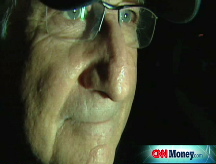Madoff's trading fiction
Statements Bernard Madoff sent to clients each month pointed to clever trading strategies - but none could have produced the stated returns.
NEW YORK (CNN) -- As Bernard Madoff was telling his investors they were earning double-digit annual gains, it appears he wasn't even investing their money, according to a CNN investigation of his reported trades.
Madoff, facing a criminal charge of securities fraud for allegedly cheating investors of tens of billions of dollars, sent monthly statements to clients detailing their supposed trades and the value of their accounts.
For decades, Madoff customers say, Bernard L. Madoff Investment Securities reported yearly returns of as much as 18%; in the past couple of years the reported gains were 10% to 12%.
But an analysis of statements obtained from Madoff clients finds the reported trades could not have yielded the profits Madoff claimed.
"These statements are probably fictional and pure imagination," said Michael Schwartz, Chief Options Strategist with Oppenheimer & Co., after reviewing Madoff's supposed transactions.
In November, the last statement sent to investors, Madoff reported buying 35 well-known stocks, members of the Standard and Poor's 100 Index.
At the same time he claimed to be locking in potential profit by selling Standard and Poor's 100 Index Call Options (which give the right to buy the index at a certain 'strike price'), and protecting against downside risk by buying S&P 100 Put Options (which give the right to sell the index at a certain 'strike price').
The Call and Put strike prices were close to each other, which would make the strategy a conservative one.
At best, veteran options experts calculate, it would have yielded returns of no more than a couple percentage points above Treasury-bills (the one-year T-bill currently yields 0.42%), rather than the double-digit returns Madoff reported.
"These strategies would have yielded 2% to 3%," said Greg McMurran, Chief Investment Officer of Analytics Investors.
And in today's market, pros point out, the approach would likely suffer losses. "They're losing money right from the inception," said Schwartz.
Investment pros also point out the market where Madoff would have had to have executed his strategy of selling S&P 100 Calls and buying S&P 100 Puts - the Chicago Board Options Exchange - never had the volume of trading Madoff would have required for the billions he was supposedly managing.
"The market wasn't big enough for the types of volumes he needed," said McMurran, a fact the CBOE confirms.
Such revelations have been devastating for Larry Leif - a Madoff customer for three decades, who said he read his statements every month and thought he was doing well.
"They're all fakes and basically everything I own is gone," said Leif, holding his Madoff paperwork.
Leif could have known earlier because trades listed on his statements are inaccurate. Madoff reported buying Microsoft stock for Leif last Nov. 12 at $21.81. In fact, Microsoft never traded above $21 that day! There are similar inconsistencies for other stocks like Citigroup, Coca-Cola and Apple that Madoff claimed to have bought.
Madoff in November also reported putting cash into Fidelity Spartan U.S. Treasury Money Market Fund. Fidelity says it hasn't had a fund by that name since 2005.
"We're not aware of any investments by Madoff in our funds on behalf of his clients," said Fidelity spokesperson Adam Banker.
Bernard Madoff claimed in a 2001 article that his firm executed trades for investment clients. "We're perfectly happy making the commissions," Madoff was quoted in the hedge fund industry publication MARHedge. But the Financial Industry Regulatory Authority, which examined the books of Madoff's trading firm every two years, found no evidence of trading for retail clients.
"There was no indication of trades being executed on behalf of the investment advisory. There was no indication of customer accounts being generated," said Herb Perone, spokesman for FINRA.
The criminal complaint against Madoff says he admitted to two senior employees of his firm - identified by well-placed sources as his sons Mark and Andrew - that "'it's all just one big lie.' and that it was 'basically, a giant Ponzi scheme.'" In such scams clients are paid with money received from new investors. Madoff estimated the losses from the fraud to be at least $50-billion, according to the criminal complaint. But that figure may include phantom profits.
Madoff's attorney Ira L. Sorkin refused comment on CNN's analysis of Madoff's reported trading. With regard to the Madoff scandal, Sorkin said, "This is a tragedy. We are cooperating fully with the Government investigation to minimize losses." ![]()


